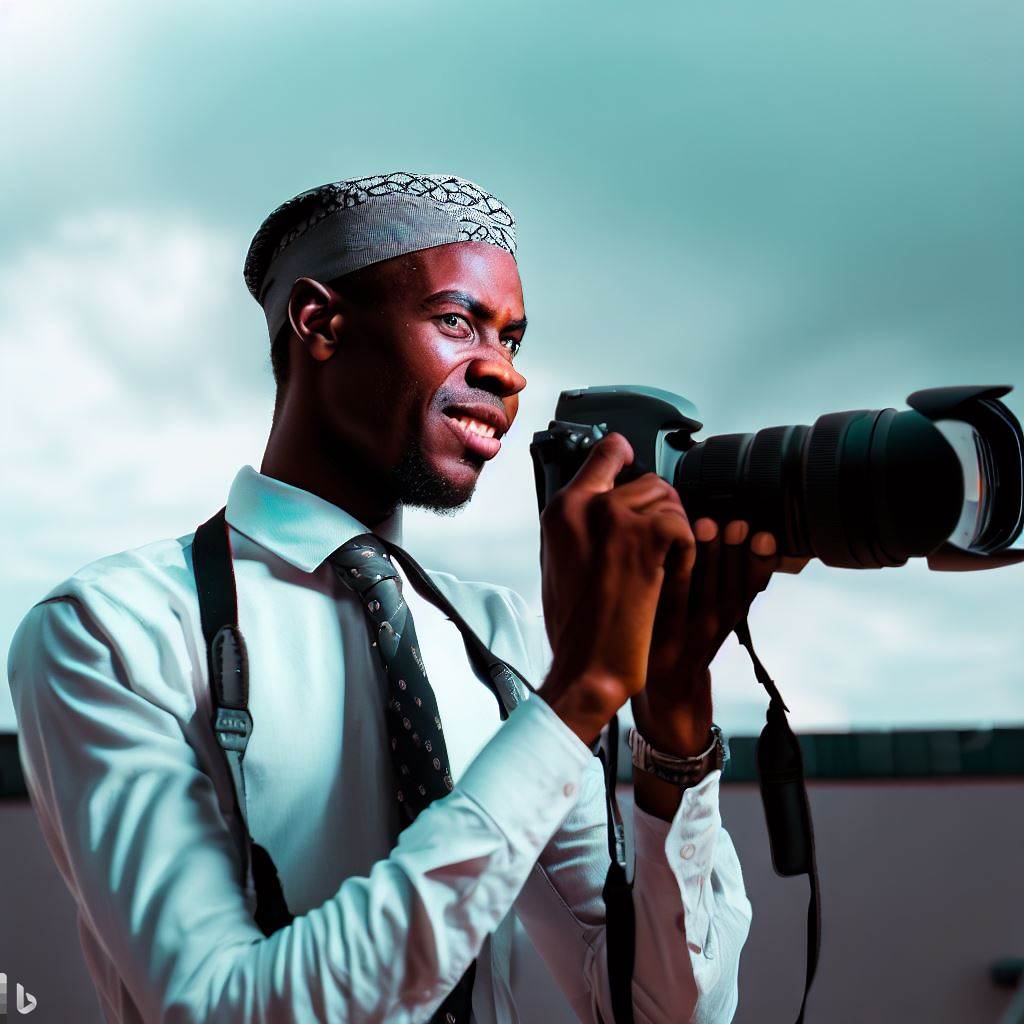Introduction
Photography plays a crucial role in Nigeria, capturing moments, preserving memories, and documenting history.
In this blog post, we will explore the importance of photography in Nigeria and provide an overview of the content to follow.
Photography in Nigeria is not just about capturing beautiful images; it holds immense cultural and historical significance.
It serves as a visual medium to express the diverse Nigerian culture, tradition, and heritage.
Moreover, photography plays a key role in documenting and preserving historical events, such as political movements, social changes, and important milestones in Nigerian history.
It helps create a visual record for future generations to understand and learn from.
In this blog post, we will delve into the various career opportunities in photography in Nigeria.
We will explore the different specializations within the field, such as fashion photography, wedding photography, and documentary photography.
Furthermore, we will discuss the salaries that photographers can expect in Nigeria, considering factors like experience, skill level, and the demand for their services.
We will also provide insights into the challenges photographers face and the potential growth opportunities in the industry.
Whether you are a budding photographer exploring career options or someone interested in the photography industry in Nigeria, this blog post will provide valuable insights into the importance, careers, and salaries in Nigerian photography.
Stay tuned for the next sections, where we will explore each aspect in more detail and provide a comprehensive understanding of the photography industry in Nigeria.
Overview of Photography Careers in Nigeria
Photography is a booming industry in Nigeria, offering a range of exciting and diverse career opportunities.
With the growing demand for professional photographers in various sectors such as fashion, weddings, events, and advertising, the industry is constantly expanding.
A. Different Types of Photography Careers Available
- Commercial Photography: This involves taking high-quality images for advertisements, product promotions, and corporate branding.
- Fashion Photography: Capturing images of models, clothing, and accessories for magazine spreads, fashion campaigns, and retail catalogs.
- Wedding Photography: Documenting the special moments and emotions of couples on their wedding day.
- Event Photography: Covering various events like concerts, conferences, birthdays, and sports competitions.
- Portrait Photography: Focusing on capturing the essence and personality of individuals through their portraits.
- Fine Art Photography: Exploring artistic expressions through photography, usually exhibited in galleries and museums.
B. Growing Demand for Professional Photographers in Various Sectors
As the Nigerian economy continues to grow, the demand for professional photographers has seen a significant rise.
In the fashion industry, photographers are needed to create striking visuals for designers, models, and fashion magazines.
Wedding photographers are in high demand due to the cultural significance and grandeur of Nigerian weddings.
Similarly, events like corporate functions, music concerts, and social soirees require skilled photographers to capture memorable moments.
The advertising industry also employs photographers to create impactful images for marketing campaigns.
With the rise of social media and e-commerce, businesses rely heavily on visually captivating content to attract their target audience.
This has created a tremendous opportunity for photographers to work with brands and agencies.
C. Role of Photography in Preserving Nigerian Culture and History
Photography plays a crucial role in preserving Nigerian culture and history.
Through photographs, significant cultural events, traditional ceremonies, and historical landmarks are documented for future generations to appreciate.
Photographers travel across the country, capturing the diverse cultural practices, traditional attire, and vibrant festivals that define Nigeria’s rich heritage.
Nigerian photographers are also involved in projects that highlight important social issues, such as human rights, gender equality, and environmental conservation.
By using their lenses to raise awareness and provoke conversations, photographers contribute to shaping public opinion and bringing about positive change.
Furthermore, photography has the power to challenge stereotypes and showcase the beauty and resilience of the Nigerian people.
By capturing authentic and diverse images, photographers break away from mainstream narratives and present a more nuanced perspective.
Therefore, photography careers in Nigeria offer an array of opportunities across various sectors.
With the growing demand for professional photographers, individuals with a passion for photography can turn their hobby into a successful profession.
Moreover, by documenting Nigerian culture, history, and significant events, photographers contribute to preserving the nation’s identity and portraying its people in a positive light.
Read: Women in Nigerian Fashion Design: Leaders & Innovators
Skills and Education Required for a Photography Career in Nigeria
For individuals aspiring to pursue a photography career in Nigeria, there are certain skills and educational qualifications that are essential to thrive in the industry.
1. Technical Skills
- Proficiency in operating various camera models and understanding their features.
- Knowledge of lighting techniques to create the desired mood and effect.
- Expertise in post-processing software for editing and enhancing photographs.
- Awareness of composition rules and understanding how to frame subjects effectively.
- Ability to capture moments and evoke emotions through photography.
2. Creativity and Artistic Vision
In the photography industry, creativity and artistic vision are highly valued and can set photographers apart from the competition.
- Developing a unique style and having a distinctive visual voice.
- Thinking outside the box to bring new and innovative ideas to photography projects.
- Having an eye for detail and composition, allowing for the creation of compelling images.
- Being able to interpret a client’s vision and execute it in a creative manner.
- Constantly seeking inspiration and staying updated with current trends in the industry.
3. Recommended Education and Training Options
While a formal education is not a prerequisite for a successful photography career, it can provide aspiring photographers with a solid foundation and valuable skills.
- Enrolling in photography courses or workshops to gain technical knowledge and hands-on experience.
- Pursuing a degree or diploma in photography or a related field, which can offer a comprehensive understanding of the industry.
- Attending seminars and conferences to learn from established professionals and gain industry insights.
- Interning or assisting established photographers to gain practical experience and network within the industry.
- Continuing education through self-study and online resources to stay updated with the latest techniques and technology.
In short, to have a successful photography career in Nigeria, aspiring photographers must possess technical skills such as camera operation, lighting techniques, and post-processing.
Additionally, they need to nurture their creativity and develop a unique artistic vision. While formal education is not mandatory, it can provide a competitive edge and expand one’s knowledge and skills.
Continuous learning and staying current with industry trends are crucial in this ever-evolving field.
With dedication, passion, and the right combination of skills and education, aspiring photographers can turn their passion into a thriving career in Nigeria’s photography industry.
Read: Fashion Design Technology in Nigeria: An In-Depth Look
Challenges and Opportunities in the Nigerian Photography Industry
The photography industry in Nigeria, like many other countries, faces its own set of challenges and opportunities that shape the careers and salaries of photographers.
Understanding these factors is crucial for aspiring photographers wishing to navigate this competitive industry successfully.
A. Competition among photographers
In Nigeria, the photography industry is highly competitive.
With the increasing number of skilled photographers entering the market, standing out becomes a challenge.
Photographers need to continuously improve their skills and find ways to differentiate themselves from the competition.
B. Lack of standardized regulation and copyright protection
One significant challenge faced by Nigerian photographers is the lack of standardized regulation and copyright protection.
Without proper regulations, it becomes difficult to enforce copyright laws, leading to unauthorized use and reproduction of photographs. This results in revenue loss for photographers.
C. Emerging opportunities in the digital age
The digital age has brought about significant opportunities for photographers in Nigeria.
Social media and online platforms provide a way for photographers to showcase their work to a wider audience and attract potential clients.
By leveraging these platforms, photographers can gain exposure and attract more lucrative opportunities.
D. Importance of networking and building a reputable portfolio
Networking and building a reputable portfolio are essential for photographers in Nigeria.
Developing relationships with clients and industry professionals can lead to referrals and collaborations, opening doors to higher-paying projects.
Additionally, a strong portfolio showcases a photographer’s skills and style, helping to attract potential clients.
The Nigerian photography industry presents both challenges and opportunities.
While competition among photographers is intense, emerging digital platforms offer avenues for exposure and growth.
However, the lack of standardized regulation and copyright protection remains a significant hurdle.
By networking, building a reputable portfolio, and adapting to the digital age, photographers can navigate this industry and achieve success.
Read: Nigeria’s Design Industry: Challenges and How to Overcome Them

Delve into the Subject: Sourcing Materials: Interior Decorators’ Guide in Nigeria
Salaries and Income Potential for Nigerian Photographers
When it comes to photography in Nigeria, the income potential can vary widely depending on several factors.
These factors include experience, expertise, location, and client base.
A. Factors influencing photography income
- Experience: Seasoned photographers with years of experience generally command higher salaries.
- Expertise: Photographers specializing in specific niches such as weddings, fashion, or product photography can earn more.
- Location: Photographers based in major cities like Lagos or Abuja often have more opportunities for higher-paying clients.
- Client Base: Photographers who have developed a large and loyal client base can negotiate higher rates.
B. Average and range of salaries in different photography sectors
Salaries for Nigerian photographers can vary depending on the sector they work in.
- Wedding photography: On average, wedding photographers in Nigeria can earn between ₦200,000 to ₦500,000 per event.
- Portrait photography: Portrait photographers can earn between ₦100,000 to ₦300,000 for a session.
- Commercial photography: Photographers working in advertising or commercial photography can earn between ₦300,000 to ₦800,000 per project.
- Fashion photography: Fashion photographers can earn between ₦200,000 to ₦600,000 per shoot.
C. Benefits and drawbacks of freelancing versus working for a company
Photographers in Nigeria have the option to work as freelancers or join a company.
Each option comes with its own set of pros and cons.
1. Freelancing
- Pros: Freelancers have more flexibility in terms of working hours and the types of projects they can choose.
- Cons: Freelancers have to continually market themselves to find clients and may have irregular income.
2. Working for a company
- Pros: Working for a company provides a stable income and access to a steady stream of clients.
- Cons: Photographers may have less creative freedom and have to adhere to the company’s guidelines and style.
Ultimately, the decision between freelancing and working for a company depends on personal preferences and career goals.
It’s important to note that the photography industry in Nigeria is highly competitive, and photographers may need to constantly update their skills and adapt to changing trends to stay relevant and increase their income potential.
In short, salaries for Nigerian photographers can vary based on factors such as experience, expertise, location, and client base.
Different photography sectors offer different income ranges, and there are benefits and drawbacks to both freelancing and working for a company.
The key is to stay adaptable, continuously improve skills, and find a balance between passion and profitability in the dynamic world of photography.
Read: Interior Design: A Growing Field in Nigeria’s Urban Spaces
Tips for Success in the Nigerian Photography Industry
Building a strong personal brand and online presence
- Create a captivating logo and design a visually appealing website to showcase your work.
- Engage with your audience through social media platforms and regularly update your online portfolio.
- Proactively seek opportunities to collaborate with influencers and brands to increase your visibility.
Developing a diverse portfolio to cater to various clients and niches
- Experiment with different genres of photography to expand your skillset and attract a wider clientele.
- Showcase your versatility by including a range of subjects and styles in your portfolio.
- Customize your portfolio for specific clients or niche markets to demonstrate your expertise and understanding of their needs.
Continuous learning and staying updated with new technologies and trends
- Invest in regular training, workshops, and online courses to enhance your technical and creative skills.
- Stay updated with the latest photography equipment, software, and editing techniques.
- Follow renowned photographers and industry experts on social media to stay informed about emerging trends and inspirations.
Networking and collaborating with other professionals in the industry
- Attend photography exhibitions, conferences, and meetups to connect with fellow photographers and industry influencers.
- Join online photography communities and forums to engage in discussions and share knowledge.
- Collaborate with other professionals, such as makeup artists, stylists, and models, to expand your network and create impactful work together.
Providing exceptional customer service and building strong client relationships
- Communicate effectively with clients, understand their requirements, and respond promptly to their inquiries.
- Show professionalism and reliability by delivering high-quality work on time.
- Seek feedback from clients and use it to improve your skills and services.
- Build long-term relationships by offering personalized experiences and going the extra mile to meet and exceed client expectations.
Maintaining a healthy work-life balance and self-care
- Avoid overbooking yourself and prioritize self-care to prevent burnout.
- Take breaks, exercise, and engage in activities outside of photography to recharge and maintain creativity.
- Delegate tasks or outsource when necessary to alleviate workload and focus on your core strengths.
- Set realistic goals and reward yourself for achieving milestones to stay motivated.
By implementing these tips, aspiring photographers in Nigeria can increase their chances of success in the competitive industry and establish themselves as top-notch professionals.
You Might Also Like: Eco-Friendly Design: A New Wave in Nigeria’s Interiors
Conclusion
Photography plays a vital role in Nigeria, capturing the essence of its diverse culture and people.
It has become a part of our everyday lives, documenting moments and preserving memories.
For aspiring photographers, this field offers immense opportunities for growth and success.
With the right training and dedication, one can pursue their passion and carve a niche for themselves in the industry.
It is important to keep pushing boundaries, experimenting with different styles, and seeking new opportunities.
The photography industry in Nigeria is evolving, and there is a need for fresh and innovative talent.
If you are interested in pursuing a photography career in Nigeria, don’t hesitate to take that first step.
There are various avenues to explore, from freelancing to working with established studios and agencies.
Remember, success in photography requires not only technical skills but also a keen eye for detail, creativity, and the ability to connect with your subjects.
It’s a journey that requires continuous learning and perseverance.
So, whether you dream of becoming a wedding photographer, a fashion photographer, or an expert in documentary photography, go ahead and pursue your passion.
Nigeria is waiting for your unique perspective and talent.
Photography is a powerful medium that has the ability to tell stories, evoke emotions, and capture moments in time.
If you have a love for photography and a desire to make it your career, don’t wait any longer.
Embrace the opportunities in the industry and embark on an exciting and fulfilling journey as a photographer in Nigeria.
Publish Your Professional Profile, Business or Brand
Showcase your expertise, gain trust, and boost visibility instantly on Professions.ng.
Publish Now



